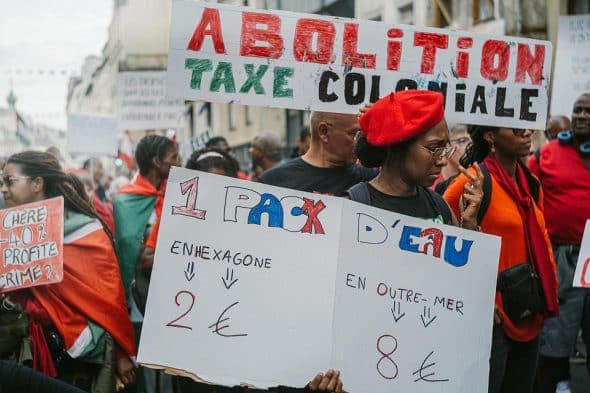Since early September, the working class in Martinique, an island in the Caribbean and a remnant of France’s colonial empire, have taken to the streets to protest against the disproportionately high cost of living. On average, the price of food items is 40% higher and poverty is twice as high in Martinique as it is in ‘Metropolitan’ France, according to a 2022 study from the National Institute of Statistics and Economic Studies, a French government agency. For certain products like bottled water, the price is up to 114% higher in Martinique, which after decades of soil contamination due to pesticides has been made essential as tap water is undrinkable in large parts of the island. The Assembly for the Protection of Afro-Caribbean Peoples and Resources (RPPRAC), which is leading the protest movement, has refused to end the fight despite intense repression and the proposed half-measure from the government and distribution companies to reduce prices by 20% for a select list of the most consumed food products.
Imperialism is responsible for the state of affairs in France’s colonies. All of France’s colonies – not just Martinique – experience disproportionately high cost of living and poverty rates. In each of them, the major owners of land and transport and distribution companies are what are called in Antilles the ‘békés’, descendants of French colonialists and slaveowners, who accumulated capital at the expense of the local communities, or in the Caribbean, brought over slaves from West Africa to work the land. France’s colonies are also hyper-reliant on imports from France. On average, 65% to 95% of foodstuffs are imported in French ‘overseas territories’, lining the pockets of distribution and transport companies which sell these products for exorbitant prices to people who have no choice but to buy them, lest they starve. On the flip side, most colonies export cash crops which go directly to France, like bananas and sugar, and which present little benefit to the people of the colonies.
A collective of over 700 people, the RPPRAC started out picketing Fort-de-France port, the island’s main port. Now, the mobilisation includes picketing supermarkets, protests, road blockages and strikes, and is spreading to the neighbouring island of Guadeloupe, another one of France’s colonies. The strength and unity of the people of Martinique were immediately met with brutal repression from the French state. Bans on protest, curfews, arrests of key figures, and the deployment of the CRS 8 (Compagnie Republicaine de Securite) – a special security forces unit – have all been used to contain and suppress the anger of the Martiniquais people. The CRS had not been sent to Martinique for over 60 years, since the killing of three young Martiniquais during protests against racial inequality in 1959, after which the colonial security force was effectively banned from the territory. Protests against the cost of living are not new in Martinique and Guadeloupe – 2009 in particular was marked by large protests – but the deployment of the CRS is indicative of a larger crisis of French imperialism.
Between the ongoing unrest in New Caledonia, the coups in West Africa and the mobilisation in Martinique and Guadeloupe, French imperialism is desperately trying to hold on to its last colonial strongholds. A militant movement which unites all French colonies has the power to deliver a critical blow to the French imperialist state. The basis of a real anti-imperialist, working class movement in France will be the unity of the struggle against imperialism in the colonies with that against racism at home.




